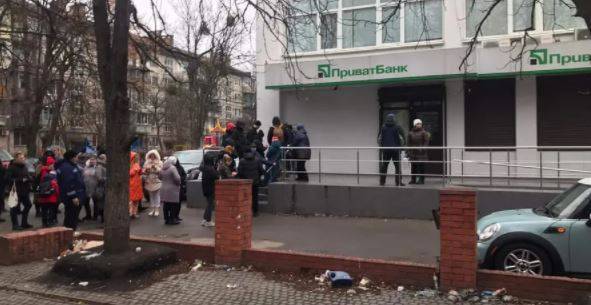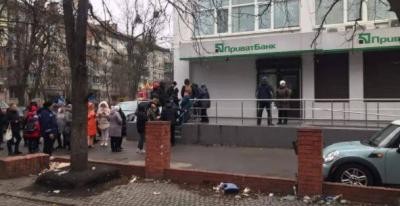The world is turning its attention to Ukraine, where the conflict between Kyiv and Moscow is intensifying, alongside numerous other parties. In the context of the war atmosphere accompanying the crisis in Ukraine, "Sky News Arabia" contacted members of the Lebanese community and other Arab communities there, particularly students trapped in their homes, to learn about their conditions, especially since a significant number of Arab students are in Kyiv and nearby cities.
"Sky News Arabia" learned that Lebanese and Arab students are living in fear due to the universities' responses concerning attendance, which prevented them from leaving last week, especially since not all Ukrainian universities offer online education. A member of the Lebanese community shared with "Sky News Arabia" that "the prices of essential goods like gas and fuel have risen due to the crisis, and food prices have increased by 15 to 20 percent, which affects the expenses of Lebanese students who are already suffering from a dollar crisis in their country."
Lebanese medical student Jawad Marmar, currently in Kirovohrad, Ukraine, said: "We hear aircraft and shelling, and the university continues but shifted to online education on Wednesday, which prevented us from leaving because the administration had refused online education. We are under pressure to stay, especially graduating students." Marmar described the situation, saying: "The stores near where I live are closed. There are long lines in front of supermarkets and ATMs, and the situation has led to a loss of trust in banks. Everyone here is afraid that the banks will cease operations, even those affiliated with the government, after reports of approximately $23 billion being transferred out of the country."
He concluded: "We call on the Lebanese embassy in Ukraine to assist us in returning to Lebanon as soon as possible. I have started to stock up and be cautious, especially after the declaration of martial law in Ukraine, which is stricter than a state of emergency. This affected movement from one city to another."
Lebanese student Hadi Nzeh Taradia, who is also studying medicine, explained: "More than 70 percent of Lebanese students are still in Ukraine. We stayed here to avoid losing our academic year. We demand to be evacuated swiftly. We did not expect the airport to be bombed here in western Ukraine."
The mother of one of the Lebanese students, university professor Faten Raad, spoke about her daughter Suha, who studies in Ukraine: "My daughter, a sixth-year medical student, was forced to return to Lebanon, despite the university's threats to expel any student who leaves, especially graduating students. However, I insisted on her leaving as soon as I heard the situation would worsen there, and I thank God she is currently in Lebanon."
In a similar vein, Egyptian student Muhanned Ali Al-Sayed described the situation as "very difficult," stating: "I live in Dnipro and the shelling has been ongoing since five in the morning. There are crises and queues at gas stations and supermarkets, overcrowding in public transport, and a state of panic with attempts to stock up on food." Al-Sayed reported to "Sky News Arabia": "There are many Arab students here, especially from Morocco, Tunisia, Lebanon, and Egypt," explaining that the Moroccan embassy hurried to evacuate its citizens last week, and "only a few remain, while Lebanese and Egyptian students are still in the country. We are waiting at home and stocking food while waiting for a decision from the Egyptian embassy, keeping windows closed. The city is unsafe. There are approximately 3,000 Egyptian students in Ukraine."
Tunisian student Marwa Al-Sharif, who studies dentistry in Ukraine, is facing a more challenging situation as "there is no Tunisian embassy in Ukraine. The embassy is based in Moscow, and I am in contact with my friends and Arab colleagues. We are all waiting for evacuation flights while airports in Dnipro and other cities are closed." She continued in her conversation with "Sky News Arabia": "Fear dominates the situation in the city, and banks have stopped functioning. I hope to travel quickly and urge my country to repatriate us from Ukraine. So far, there is internet and electricity, and we hope that both services, especially the internet, remain intact."
After the security situation worsened in Ukraine, Lebanese Foreign Minister Abdullah Bou Habib stated on Thursday that Beirut is monitoring the conditions of Lebanese citizens in Ukraine, adding: "We have contacted the authorities in Romania and Poland to secure their exit by land." He also commented on the crisis, with the Director of Political and Consular Affairs at the Lebanese Ministry of Foreign Affairs, Ambassador Ghadi Khouri, stating that Bou Habib summoned all ambassadors from relevant countries in Lebanon to discuss the matter with them and establish a mechanism for the immediate repatriation of students to Lebanon, indicating that the minister will hold a broad meeting with them on Thursday evening. Khouri explained to "Sky News Arabia": "There are about 800 Lebanese students pursuing their studies in various fields, and the Lebanese community exceeds that number substantially."
The Lebanese Foreign Ministry advised on February 14 that Lebanese citizens in Ukraine should leave voluntarily and quickly until tensions subside and things return to normal. It also advised Lebanese students enrolled in Ukrainian universities to communicate and coordinate with their university administrations beforehand to safeguard their rights and ensure their academic obligations.




